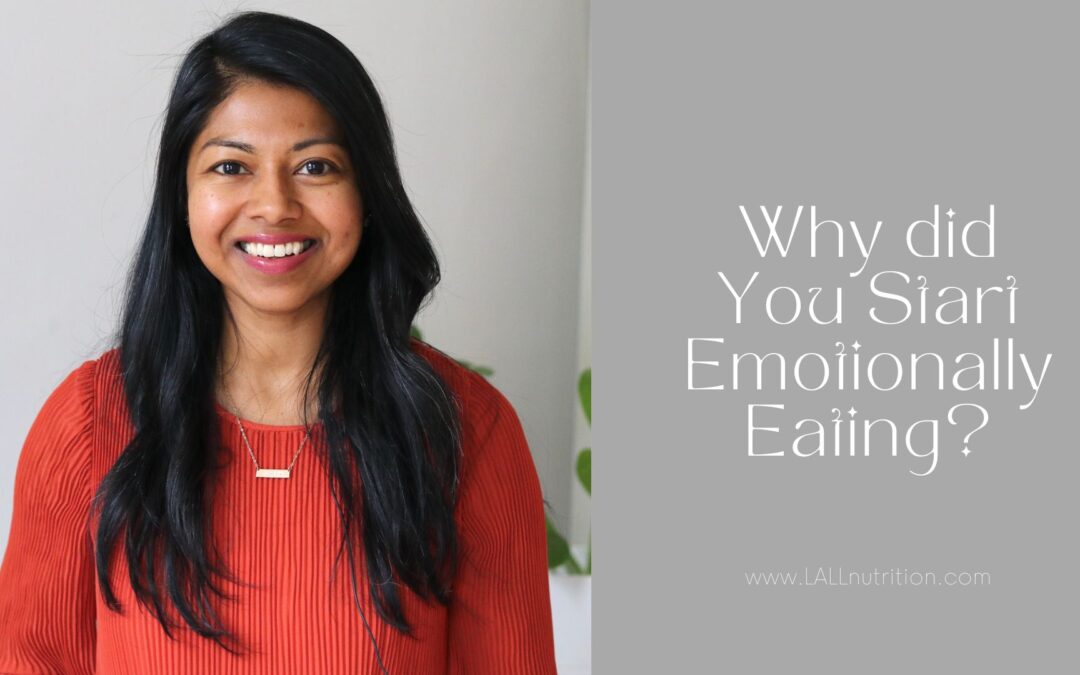Hello love,
How do we even develop emotional eating?
A lot of the times we’re running around like chickens with our heads cut off “I’m out of control with food. I’m out of control with this”.
We’re spinning.
It’s like our mind is so busy trying to find a solution to not obsess but we don’t even understand why we have this pattern to begin with.
This is an important starting point because we want to understand ourselves. We want to understand where this pattern is coming from because that’s going to open us up to a solution that’s going to work for us and that’s going to open us up to understanding what we truly need.
So there is no shame. There’s no blame.
When I was on my emotional eating journey, I didn’t know what I know now. I didn’t realize where this pattern was coming from. I was just trying to fill that void, to try to feel better, to try to gain the acceptance or whatever that was. I was trying to gain it with whatever information I could find.
Sadly the information that’s out there is to try the latest diet. It’s to lose the weight, it’s to exercise more, and it’s really on the surface.
Even if we dig a little bit deeper and we go to therapy, it’s still missing the mark because we’re not getting into that deeper void that we’re feeling. We don’t know how to be with it. We may have a lot of awareness but we haven’t resolved it. We haven’t filled the hole.
Understanding how this pattern forms
It’s important to understand how this pattern forms. A lot of what I share is through my own experience, it’s through looking at different angles of this pattern and putting the pieces together. It’s with working with clients. I’ve created this methodology through my experience resolving this pattern and with helping my clients.
When I really peel it back, the emotional eating coping mechanism starts when we’re very young. Emotional Eating is when we use food to soothe ourselves from any discomfort, distress or uncomfortable emotions.
So where are these uncomfortable emotions coming from?
When we’re children, we are feeling emotions all the time. We are sensory. We don’t have cognition.
We’re just feeling things. Our emotions are a guidance system. So whenever we feel good or happy, we move in that direction. When we feel hurt or sad, it’s meant to give us information. But we needed our parents or caregivers to be able to help us move through this discomfort and these emotions because of course they feel uncomfortable in our body.
What happened to us?
What happens to a lot of us is that our parents/caregivers dismissed our emotions. They denied them, pushed them away or they got angry with us for being too sensitive. When we had these big emotions, it could have triggered them into their emotions.
So they shame us, which makes us suppress our emotions. This is what our society does. We’re always looking for the next bandaid to run away from our emotions because we don’t know what they are.
Most likely you wouldn’t have gotten that modelling from your parents/caregivers to move through the uncomfortable emotions. They wouldn’t have been able to hold space for you to move through those emotions to help you regulate your nervous system. So these emotions, this uncomfortable feeling, it doesn’t go away. It gets triggered because now it lives in our body.
It’s stored as trauma and we need something to take the edge off when it gets triggered.
Food, nourishment and love are interconnected. When we’re babies, we’re breastfed/fed and we’re physically close to our mothers. We make this association that food and love are connected. Food also happens to be pleasurable. So when we eat food, physiologically it releases dopamine.
Some foods are more pleasurable than others and give us a bigger dopamine hit. Usually these foods are processed because they’re designed to be more addictive and fills this void. But it’s a temporary solution. It’s a Band Aid fix.
We go through our lives and may not notice this pattern until later on. It’s not like we “decided” to eat food one day as a child to cope. But over time it becomes more prevalent and automatic.
Emotional eating leads to…
It might then lead to feeling out of control in our body and around food resulting in health issues and weight gain. Our society it says if you look a certain way and you do certain things, then you’re going to be loved and accepted. That’s our deep longing. We want that acceptance, that love, that validation. We want to feel, okay.
We don’t want to feel this discomfort. We want to feel in control. So we go and do the things that we’re told or we see around us. Maybe that person lost weight and they’re getting the love, validation, and attention we crave.
We do the diets, the exercise, the pills, the surgeries., etc because we think something is wrong with us. That we need to fix ourselves and we start going down this road.
We build up all of these beliefs in our head and we follow the diets, we over exercised and we push ourselves because in our culture, in our society, that’s what we’re told to do. It’s not in the name of being healthy and feeling good in our body. It’s in the name of gaining some validation, some attention, and some acceptance.
There’s nothing wrong with wanting to be seen, validated and accepted when it’s coming from a healthy space. But when it’s a craving and it’s this yearning, it’s unhealthy because we are trying to fill something in us that should have already been filled.
So that’s how the pattern forms. Some iteration of this is what I see with clients. It all boils down to our relationship to food, our body and our emotions. We need to make sure these pieces are connected.
Turning towards yourself
This is where we need to turn towards ourselves and start looking at these areas. This is a process. We need to peel back the layers. This is so important, as we see how this pattern is formed, we need to unravel it. Inside of The Emotional Eating Evolution Program, that’s what we do. We unravel all of these layers and each layer brings you closer and closer back to your true needs, what you needed in terms of nourishment, in terms of movement or rituals around your body.
As we move through these three areas, this is how we resolve the emotional eating pattern. You also start feeling confident in your body and around food. You start realizing it’s not about the food, but you have a healthier relationship to food. So you nourish your body because it’s more about feeling good versus craving something and looking for that acceptance or validation. You start accepting your body, which becomes the foundation to appreciating your body and loving your body.
You’re not pushing and punishing and criticizing yourself. And you move through those uncomfortable emotions, those unresolved events that created this pattern, and you realize what your deeper needs were. Because inside of those emotions are the deeper needs that we didn’t have met. And so we get to resolve it on a body level where we hold trauma and we store it. So we need to get into the body in order to really shift this pattern.
So all of these areas combined really help you move through this in a powerful way.
Invitation
So I just want to say, if what I’m saying to you is resonating then I’d love to invite you to find out more about The Emotional Eating Evolution Program. So this is the program, it’s my step by step methodology.
Inside of it you will get the literal how to move through this pattern. You get lots of support, guidance and meditations to see your particular pattern and what’s going on in your life to help you move through this and resolve it from the root so you can finally feel confident in your body and around food and not obsess and just feel good and feel okay. So thank you so much for watching. Please be sure to like and subscribe, and I hope you have a great day.
To true resolution,
Michelle
Certified Holistic Nutritionist specializing in Emotional Eating


